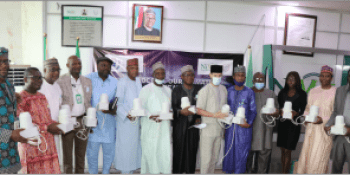Gender-sensitive research key to empower both men and women farmers

A recently held CGIAR 'Knowledge Day' provided an opportunity for researchers to showcase the ongoing work being carried out. The focus was also to highlight the gender-specific projects among the CGIAR research programs and the way forward for gender-research.
To reach a synergy between poverty and power we need to consider equitable structures and social norms. This means especially taking into account the dimension of gender throughout research that is seeking to have an impact on poverty.
We need also to target vulnerable groups and encourage women to take on leadership positions; increase women's particpation in higher decision-making, ensure greater access to information and technologies, and through that improve livelihood choices.
In the light of these ideas and thoughts, the first CGIAR ‘Knowledge Day’ was held in Nairobi at the beginning of November. It was organized by the International Livestock Research Institute (ILRI) and World Agroforestry Centre (ICRAF) on behalf of the CGIAR Fund Council, CGIAR and member centers.
Having the title ‘Value for Money Propositions: How CGIAR research programs contribute to system-level outcomes, with a focus on gender’ the purpose of the event was to discuss and showcase the work done in the various CGIAR Research Programs.
The different gender-related sessions explored how gender can enhance achievement of System-Level Outcomes, and the results, gaps and plans of gender research in the CGIAR. Gender representatives from the CGIAR Research Program on Climate Change, Agriculture and Food Security (CCAFS) Jennifer Twyman and Patti Kristjanson gave CGIAR partners an insight into current activities and outcomes so far.
Watch selected live-streamed sessions from the CGIAR Knowledge Day:
Gender mainstreaming
A poster was used to illustrate the way gender is mainstreamed throughout all four research areas - also known as flagships - within CCAFS. This is done through strategic partnerships and learning approaches to achieve gender and social differentiation outcomes.
These outcomes are aimed at increasing access to and control over productive assets and input; information; and food and markets by vulnerable groups and women, as well as to strengthen their participation in decision-making processes.
The key question, according to Patrick Dugan, Deputy Director General of the WorldFish Center, is how do we bring all of this together on the ground while acknowledging an important shift from theory to practice.
One of the ways to bring these questions and challenges together is to thoroughly mainstream gender considerations throughout our research cycle.

Poster on gender mainstreaming within CCAFS.
Linking knowledge with action
We believe that how we do research for development matters - a lot!
We won’t achieve our set outcomes without getting better at ensuring our knowledge reaches, informs and empowers women, men and youths. This is why our research approaches need to be gender-sensitive and pursue key ‘linking knowledge with action’ principles and strategies captured in the poster, including:
- Strategic partnerships and inclusive engagement processes
- Social learning approaches
- Co-developing research questions and approaches with farmer’s groups and representatives
- Gender transformative approaches
- Innovative communication approaches for scaling out
- Nested impact pathway development with partners and monitoring and evaluation (M&E) for tracking and achieving joint outcomes.
These methods are linked with innovative approaches for scaling-up, that CCAFS has been working with over the past few years. Examples include technologies being highlighted on a farm reality TV show that is now reaching millions of rural households in East Africa - called Shamba Shape Up.
Learn more about Shamba Shape Up: Farmers get latest solutions for climate 'shape-up'
Here CCAFS has provided input and information to help shape the episodes linked to climate change. The program targets East African farmers, youths included, to inform about climate-smart agriculture technologies.
Watch Shamba Shape Up episode on climate change: Kenyan farmers use climate 'entertainment' for empowerment
CCAFS scientists are also co-designing female and youth-targeted climate and agricultural information services with local partners. Participatory farmer-led videos are sharing perceptions, knowledge and climate change adaptation strategies across Africa and Asia.
Learn more about how a participatory video-project in Nepal helped voice women’s perceptions on climate change
In addition, scientists within CGIAR and partners are developing new large-scale, inclusive crowdsourcing approaches to test and evaluate new seeds with tens of thousands of farmers in Ethiopia and India. Pursuing such innovative approaches will allow us to reach more people, and more different types of people and groups, than will ‘business as usual’ science.
Read more about our work on gender-research and watch video-interviews with CGIAR researchers on gender issues.
We here at CCAFS are also determined to integrate gender concerns across all of our research themes and regional programs. Not all our research questions involve gender, but many do.
As discussed during Knowledge Day and at the recent global climate change meetings in Poland, known as COP19, achieving our gender outcomes is non-negotiable, so new approaches, strategies, targeted and enhanced investment all all needed to ensure this happens!
Manon Koningstein is a Visiting Researcher on Gender & Climate Change with CCAFS based at the International Centre for Tropical Agriculture (CIAT) in Cali, Colombia



